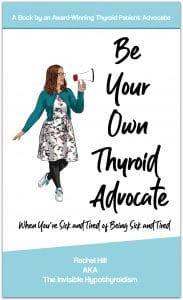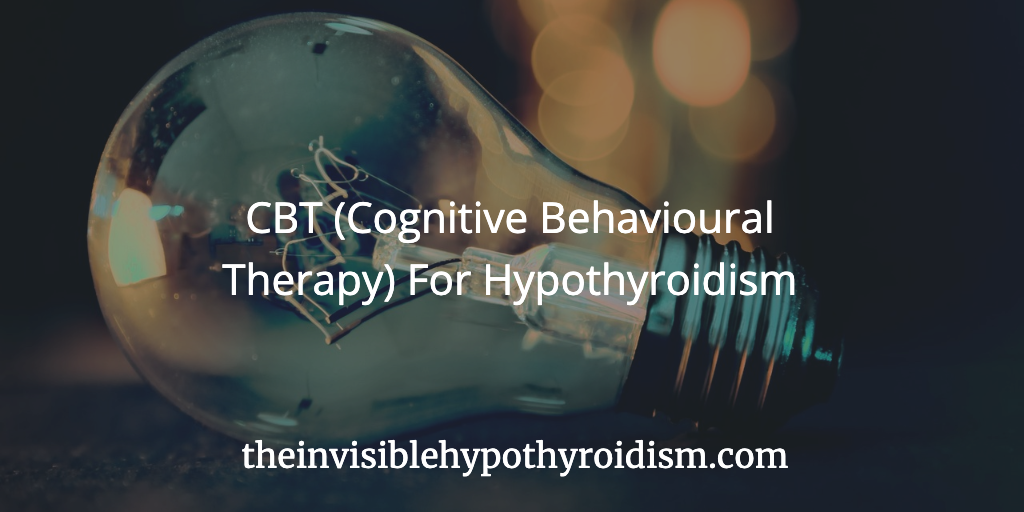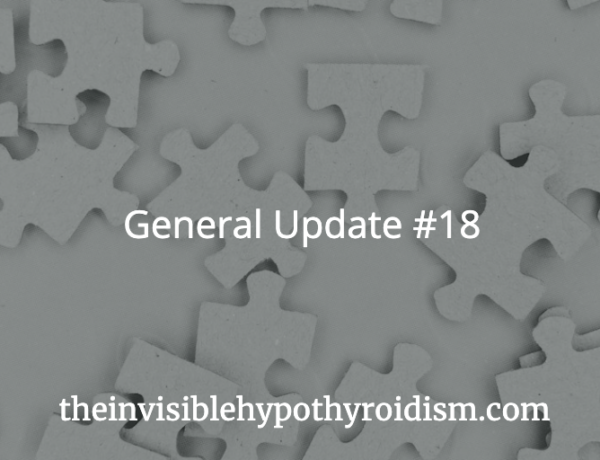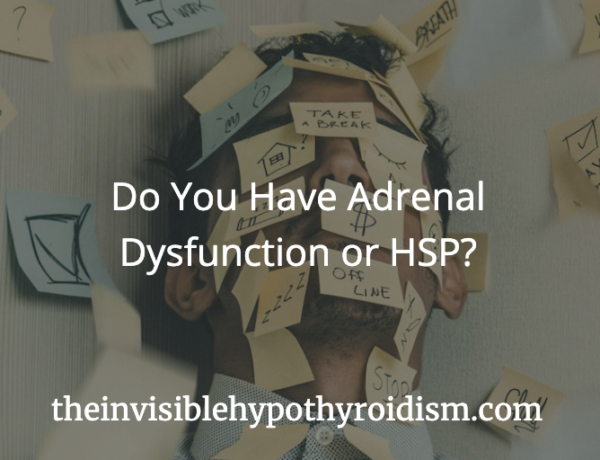When I was diagnosed with hypothyroidism in 2015, I first felt relieved. I finally had a concrete reason for the way that I was feeling and I could start working on getting well again, now I knew what the problem was.
But, I also struggled with accepting the diagnosis.
I’m an impatient person and I’m a bit of a perfectionist. I always have been!
Because of this, when I didn’t get better straight after starting thyroid medication (Levothyroxine), I felt I was a failure.
Related: Starting Thyroid Medication: How Long Will It Take Me to Feel Well Again?
I struggled to accept this chronic condition I had just been diagnosed with and the thought of living this way (at the time, a very poor quality of life) for the rest of my life was devastating.
This pushed me in to a deep depression and my anxiety disorder, which I’d had most of my life and before the diagnosed thyroid issues, also flared up.
It is worth mentioning that I was also non-optimally treated for the hypothyroidism at the time, which involved being on Levothyroxine (which did not work for me) and having low thyroid hormone levels (Free T3).
Doctors repeatedly encouraged me to take antidepressants and even suggested I try counselling. I’d had counselling before and it didn’t really work, so when I explained this, they suggested trying something called CBT. I said of course, I’ll try anything to help me feel better.
I took CBT sessions whilst also working on improving my physical health. This involved switching from Levothyroxine to NDT medication.
What is CBT?
Cognitive behavioural therapy (CBT) is a talking therapy that can help to address unhealthy thought patterns. It is most commonly used to help treat anxiety and depression. It doesn’t ‘remove’ your problem (in my case, it didn’t fix the physical issue of low thyroid hormone levels), but it can help you to deal and process them in a more productive or healthy way.
It looks at your feelings, thoughts and how you may behave due to them i.e. negatively, which can keep you in an unhealthy cycle that doesn’t allow you to move forward with your life. CBT aims to break this cycle, by teaching you how to change negative thinking patterns and behaviours in to ones that can improve how you feel mentally.
Unlike counselling or some other forms of therapy, CBT works on current problems in your life instead of talking about past ones, and addresses them with practical ways of approaching the issues.
So, it’s about changing the way you look at things and deal with stressors.
How Did CBT Help Me?
I initially looked at my diagnosis of having hypothyroidism as a weakness and I struggled to accept this new part of my life which was always going to be there.
As someone who doesn’t particularly do well with change, it devastated me; the thought of having to deal with something so daunting, which also took over my life… I just couldn’t handle it. Mentally, I struggled a lot.
I found that CBT helped me to see that the hypothyroidism was just another part of me and my life, that I wasn’t to blame for it, and that the most productive thing to do going forward was to work on just accepting it and managing it as best as possible.
It taught me that I do not have to be ‘perfect’ all the time and I’m allowed days where my condition makes me very ill or I’m struggling. I’m allowed to put my health first and that’s not a bad thing. I’m allowed to be imperfect.
In regards to the anxiety disorder and depression, it focused on my deep rooted fears and self image issues (such as my disordered eating behaviours) and aimed to challenge my beliefs which were having a detrimental effect on me and my life, causing the excess anxiety and deep depression I was in.
The anxiety and depression took over a lot of my life in conjunction with the hypothyroid symptoms.
CBT helped me to view my diagnosis of hypothyroidism in a completely different way. It helped me to accept it and then look at it in a proactive way. I had six one-hour sessions, over six weeks, but my therapist did say that it could be lengthened in certain circumstances. However, most people find six sessions to be enough.
I was given homework, such as a thought record sheet to fill in, in order to track what kind of thoughts were getting me stressed, anxious or particularly depressed and upset, so we could work out what my deep rooted fears were, and challenge them to fix the problems in the way I was thinking.
You Have To Want it To Work
In order for CBT to help me, I had to want to get better and I had to go in with the motivation for this to work and give it all my effort. This isn’t easy when depression demotivates you, but it’s worth a try.
It’s after I finished my six weeks of CBT that I set up this blog, my Facebook support group and found a better doctor for my thyroid condition. It gave me the drive to decide what I needed to do to in order be more proactive in my own health, and get my hypothyroidism under control.
It is worth noting, however, that not having optimal thyroid hormone levels may well impact how well CBT or other therapies work for you, since they’re known to affect our mood and mental state if too low.
Other Options
The following link Has BEEN SPONSORED BY BetterHelp
As well as asking your doctor for a referral to a therapist, or paying to see one yourself, you can also seek an online therapist, psychiatrist or counsellor’s help. One option is through BetterHelp: https://www.betterhelp.com/online-counseling/
You can click on the hyperlinks in the above post to learn more and see references to information given.
Have you tried CBT? Have you found it useful? Let me know in the comments below.

The book Be Your Own Thyroid Advocate: When You’re Sick and Tired of Being Sick and Tired, which builds on this article in detail. It covers how I got my life back with Hypothyroidism and Hashimoto’s, and also included motivational and uplifting passages for those struggling with their mental health too.





